2025 A DREAM’S REALITY: THE MAKING OF A FIGHTER PILOT
By Nakonia (Niki) Hayes
Hunter was 11 years old and propped up on his father’s lap in a 4-seater airplane. This allowed him to see out of the plane’s front window so he could “fly” the airplane. His father, Mike Herbert, was a licensed pilot and figured his son might enjoy pretending to be a pilot. That was in 2010.
In 2024, Hunter was 25 years old, 6’1” tall, and still looking out of the front windows of airplanes. This time he’s a graduate of the U.S. Air Force Academy with an additional three-year period of military flight training behind him. Officially a captain in the U.S. Air Force, Hunter has been assigned to fly the premier F-35A fighter jet for his country.
This poster is wall-high in Denver’s airport, advertising the Air Force Academy. It was a fluke when he agreed to pose for the ad campaign.
According to Wikipedia, the F-35A is “a primary fighter for conducting suppression of enemy defense forces.” In other words, Hunter has agreed to fight America’s enemies with lethal force using the F-35A.
Peyton was “helping” guide him out of the hangar.
Recently married, Hunter and his wife, Peyton, who is also a recent graduate of the Air Force Academy, have moved to England for his three-year assignment at RAF Lakenheat, a British airbase. It is only one of four military bases world-wide set up for support and maintenance of the F-35A. Other bases that operate the F-35A are in Arizona, Alaska, Florida, and Utah.
Peyton will be assigned as an agent to the Office of Special Investigations (OSI) at Royal Air Force Mildenhall, about three miles from Lakenheat. She said her duties will be similar to those conducted by the U.S. Navy’s NCIS program (Naval Criminal Investigative Service).
*************************
Hunter’s story reflects a pathway of building blocks through unexpected experiences, family influences, and, at the age of 12, successfully landing his father’s airplane. His dad had explained that “landing an airplane is the hardest part of flying.” Being a successful pilot at that young age, Hunter knew he would spend his life around airplanes.
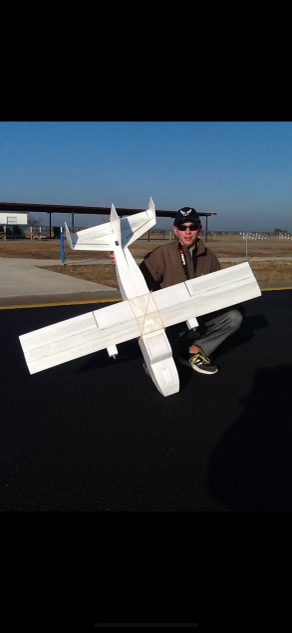
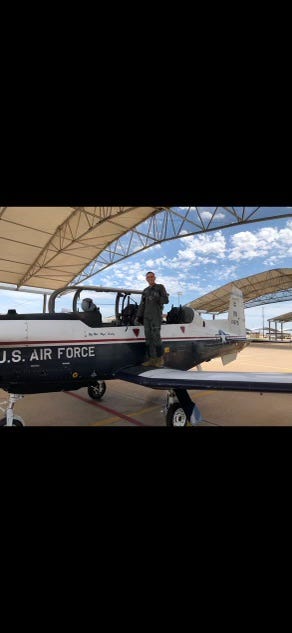
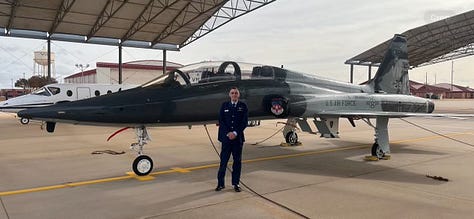
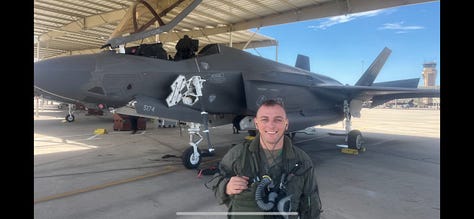
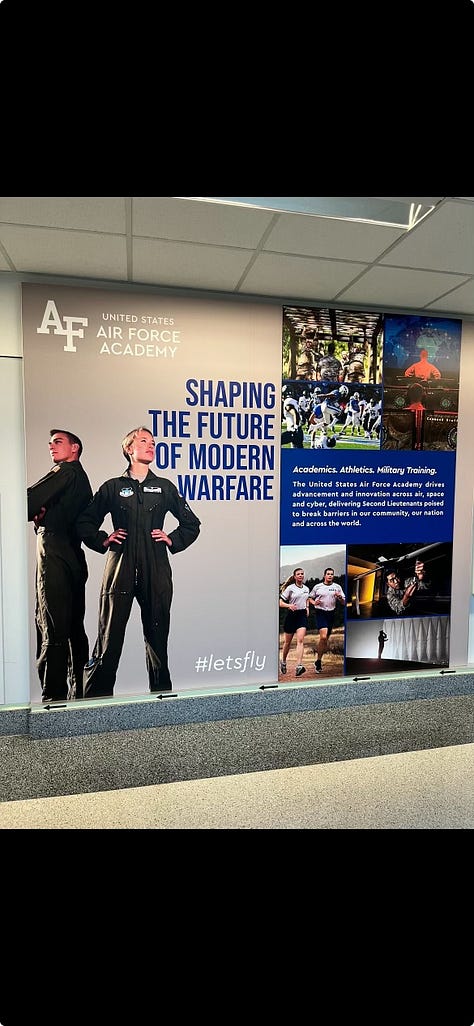
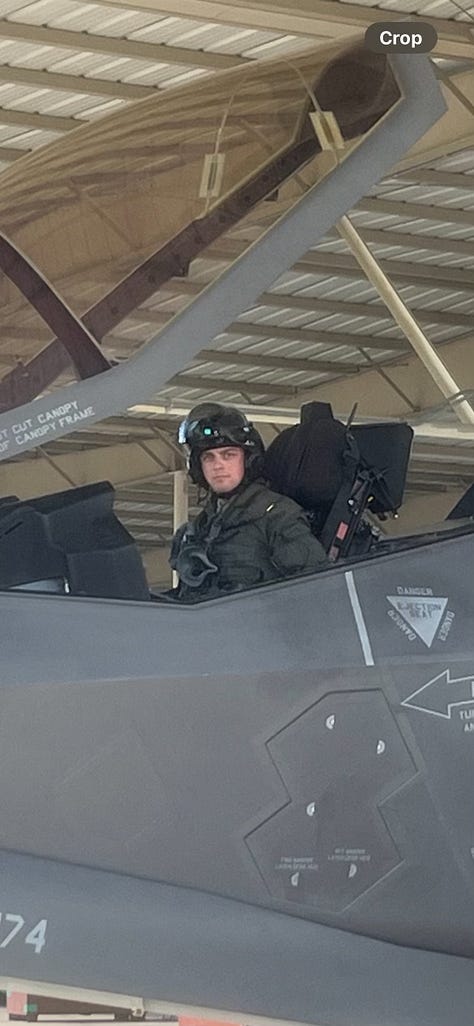
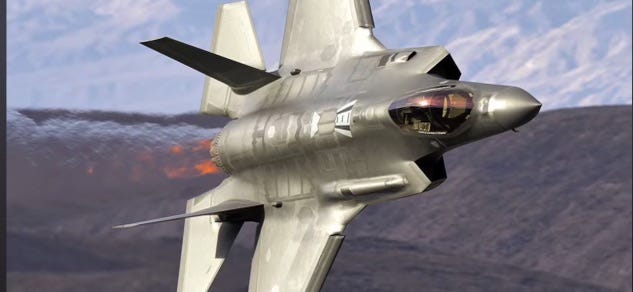
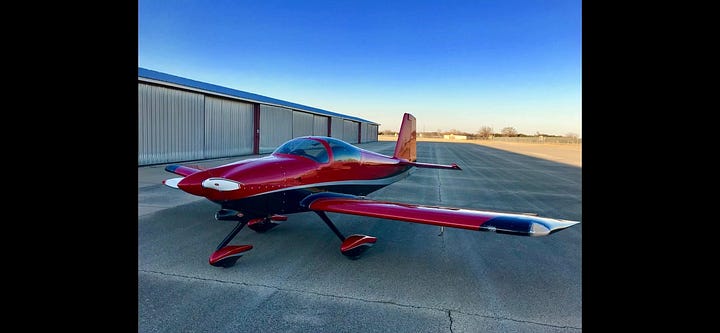
***************************
The notable building blocks for this ultimate career in aviation thus begins with his family. His father, at 6’3,” is a lieutenant with the Waco, Texas, Fire Department. His mother, Donna, has worked at Baylor University in Waco for 39 years.
As a fireman on duty 24 hours a day and off 48 hours, Mike was able to provide special family time with his son in the family airplane. That included developing special work skills from age 9 through 17 with his father’s tree-cutting business. He also learned about hunting and fishing and honoring the skills required to be successful in those activities.
A quiet young man of few words, Hunter recalled that his father’s teaching usually reflected “hands-on” or “show and tell” methods. For example, it was important for Hunter to respect the rules of firearms before they could hunt together. At four years of age, he had thus been allowed to use a .22 rifle to shoot at cans. In that process, he learned to apply simple but important safety rules with the rifle.
Then, when he was five, his father took him deer hunting to observe the full process of that skill. Hunter first sat in the deer blind and looked at magazines. The next year, at six, after allowed practices, Hunter bagged his first deer.
Subsequently, the two of them became avid hunters of big game and birds. His father hoped that hunting and fishing together would help Hunter understand that “the most valued things in life are things you can enjoy doing with someone you care about.”
****************************
When nine years old, Hunter learned another side of his father. Though a child, he would not be allowed to waste time “laying around the house” during the school’s summer break. Instead, he would be paid for working with his father’s tree trimming business. Hunter thus worked in the hot, often-100-degree Texas summers—where he learned about tools and sweat—a lot of sweat.
“This is the kind of work you’ll have to do if you don’t succeed in school,” said Mike. Hunter actually stayed with that summer work program until he left home at 17 for the Academy. When asked as an adult what he had learned from his father’s summer lessons, he smiled and said, “I learned I didn’t like that kind of work.”
Hunter never received a regular “allowance” or money that he hadn’t earned.
His most memorable teaching experience with his father was when he learned to fly the family’s airplane. By the time he was 12 years old, he was successful with the most demanding lesson in flying: “The hardest part of flying is the landing,” said his father.
By that time, the family was beginning to believe Hunter’s youthful mastery of flying and landing the airplane indicated he really was “blessed with flying skills.”
****************************
Based on the story so far, one might wonder if Hunter ever got into trouble at home or school. Yes, he did. For Mike and Donna, however, it was believed that continuous warnings to children wore off. “No” should mean “no,” and “swatting the butt” wears off for effectiveness. A punishment wouldn’t be based on, “I’m Dad. What I say goes.” Their parenting correction for their son would be based on an action which would be remembered.”
Their family focus had become one that stressed, “Actions or decisions can affect your whole life.” Another major tenet in the family was “Set your goal; then do it.”
Mike said they decided Hunter would do pushups for any misbehaviors and they had to be done immediately, no matter where he was. Both father and son say he must have done “thousands” of pushups during high school. They both remembered when he had to do pushups in the Methodist Church’s fellowship hall one Sunday. Hunter had even done pushups in parking lots and stores, as well as at home. Using slang with adults like “yep” or “nah,” instead of “yes, sir” or “no, ma’am” could result in pushups. That pushup rule remained in use until Hunter left home at 17 to enter the Air Force Academy.
He would learn that pushups used to improve Air Force cadet behavior were also normal expectations at the Academy. At least, he said, he was prepared for that particular learning method.
***********************
Hunter’s family supported the Academy’s strict rule about students’ primary roles in seeking admission to the college. “The student,” according to the Academy, “must pursue the appointment or the scholarship, not mommy or daddy. He must build his own resume of studies, activities and programs.”
They stated the Academy looks for an all-around student, not a ‘brain.’ They especially seek individuals with “non-selfish” characteristics. They wanted to see Hunter’s commitments to various groups and activities in and out of school. One particular activity that stood above the rest, according to the Academy, was the Eagle Scout award within the Boy Scouts. Hunter earned that award.
He began working on the demands of his resume during his sophomore year in high school.
*********************
The second building block for Hunter was being provided by his mom. Both parents had told him repeatedly that they expected him to “Do the best you can in school.” Donna was the one who kept a close eye on his K-12 schooling in the China Spring school district. (China Spring is a community about 20 miles west of Waco. The district prides itself on receiving high ratings for student academic achievement.)
Hunter said, “She was always there for anything I needed for home or school.” When talk of his applying for entrance to the Air Force Academy became serious, she did her own research about the program. She figured if he didn’t get into the Academy, he could still go to Baylor University.
With Hunter’s graduations from the Air Force Academy and flight school, Donna has had to accept the possibility that her son may have to fly an airplane in combat missions. Just thinking about it caused her to tear up. Frustrated, she said, “If the world would just behave itself…”
Mike had also discussed that same possibility with Hunter about war demands put on him. He asked his son, “If there is a war and you must fight, do you realize you may have to kill people or that they may want to kill you?” Hunter responded, “I know the dangers, Dad But if I don’t do it, who will? Besides, I want to serve my country.”
***********************
The third important building block centered on Hunter’s deliberate dive into the unique world of building and flying remote controlled airplanes when he was about 8 years old. There was a group of men in the Heart of Texas Miniature Aircraft Club (HOTMAC) and Hunter wanted to attend one of their meetings. Once they got there and saw the club members’ airplanes, Mike told him, “This is for big boys’ toys. It’s really a very expensive hobby.” Nonetheless, they stayed and watched as men performed intricate maneuvers with their special airplanes. Some of those planes did crash.
In spite of what they had seen, Hunter convinced his mother to take him to a hobby shop 30 miles away in Waco. Taking from his earned money, he spent $40 on a child’s remote controlled model airplane. When his father saw it, he thought, “Oh, no. That’s $40 lost for 2 seconds before it crashes.” Then he added, “Hunter actually flew that thing, repeatedly, because he fixed any crashes he had.”
Several months later, Hunter wanted to go back to the “big boys’ club.” Mike took him to meet Steve Bird, president of the association. Hunter agreed to show what he could do with his model airplane. Club members then watched this youngster, with minimal equipment, fly a remote-controlled airplane without crashing it.
Bird decided to mentor Hunter; other guys at the club took a liking to him, too. Often, if a member’s plane crashed, Hunter could usually repair it. He would search the Internet for needed pieces that could repair or completely rebuild the damaged airplanes, including his own.
Model airplanes when he was in high school.
Donna also believes the time Hunter spent with Mike’s father, plus the men calling about flying their airplane models, helped promote an early maturity in Hunter.
****************************
The fourth building block was his dad’s father, Steve. Hunter and he often spent hours together, but that time increased even more after Hunter began building and flying his remote-controlled airplanes. His grandfather had served in the U.S. Air Force, so a new common interest of flying airplanes, he said, set them up for rich and diverse conversations.
Hunter was 22 years old when his grandfather died in 2021. Steve had requested that Hunter read a special poem at his funeral: High Flight by John Gillespie Magee, Jr. A fighter pilot for the Royal Canadian Air Force, who had died in a plane crash in 1941.
Oh! I have slipped the surly bonds of Earth
And danced the skies on laughter-silvered wings;
Sunward I've climbed, and joined the tumbling mirth
of sun-split clouds,—and done a hundred things
You have not dreamed of—wheeled and soared and swung
High in the sunlit silence. Hov'ring there,
I've chased the shouting wind along, and flung
My eager craft through footless halls of air ....
Up, up the long, delirious, burning blue
I've topped the wind-swept heights with easy grace
Where never lark, or even eagle flew—
And, while with silent lifting mind I've trod
The high untrespassed sanctity of space,
Put out my hand, and touched the face of God.
Mike said, “There was not a dry eye in the room after that reading.”
His dad’s present airplane.
***************************
The last, and most important, building block in Hunter’s life had to come from Hunter himself. Good grades in his K-12 schooling were to please his parents. But when he learned in his sophomore year that a guest speaker at Reicher High School in Waco would be from the Air Force Academy, he and his parents attended the presentation.
There were specific activities that counted more heavily with the Academy for earning an “appointment” to their military college. A list was made available of desirable programs and activities.
Any interested student also had to receive a formal recommendation for Academy acceptance from a member of Congress. Those who were selected for admission would receive complete scholarships for four years with no costs to their families.
**************************
According to the Air Force Academy’s published materials, acceptance into the Academy, located in Colorado Springs, Colorado, is an explicit, demanding, and well-defined process. (See Nomination Requirements | U.S. Air Force Academy admissions.com)
“At the U.S. Air Force Academy, we look at more than grades. We look at the whole person. To improve your chances of being offered an appointment, make sure you prepare academically and physically, as well as demonstrate your character and leadership abilities.”
“Students from all over the country compete for an appointment to the U.S. Air Force Academy, making it one of the most selective universities in the country. Earning a spot begins with knowing what is required and then digging deep, not to just meet our high standards, but to surpass them. Students start completing their paperwork with credentials for Academy entry in their junior year.”
A big hurdle is often in finding someone to “nominate” the student for candidacy. No one gets into the Academy without a special invitation. The most common source of support for many students is the Congressional office in the student’s home area. Without a Congressional appointment, a student can look to some other resources, but many of those have more limited openings.
*********************
Hunter connected with some military retirees at Fort Hood (now Fort Cavasos) who, after interviewing him, agreed they would support his goal to attend the Academy. They spoke on his behalf to Congressman Bill Flores, who then nominated him for enrollment in the Academy. Hunter received his invitation in the mail, at which point he began filling out official paperwork.
********************
The family drove to Colorado in June, 2017.
New students had basic training with physical training and military instructions, often with upperclassmen teaching them, during June, July, and part of August. Classroom instruction began in mid-August.
Hunter said there were rules for everything, including how to make their beds. “We used silly words to help us remember how to make the beds correctly.” Lots of pushups and running were ordered for a whole group when one person had not followed instructions or expectations. Hunter explained, “You learned to rely on the people next to you.”
**************************
He was one of the graduates who entered flight school for three additional years of training. Each generally knows which kind of airplane he wants to learn to fly. Hunter knew he wanted a fighter plane.
The premier fighter in America’s arsenal of jets.
He said, “Why wouldn’t anybody want that?” His great excitement now is becoming an expert in flying America’s powerful F-35A fighter jet. Hunter smiled and said, “Ever since I was a kid, I’ve dreamed of this. Now I’m actually getting to live that dream.”
Hunter Herbert, fighter pilot at age 26, will be promoted to captain in May, 2025.
End
* Niki and I produced a podcast series in 2023 together featuring her book John Saxons Story
Jenny Marie Hatch
Buy the kindle version of her book HERE. And A Math Warrior’s Almanac HERE.

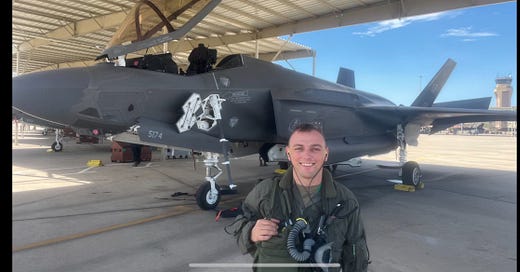



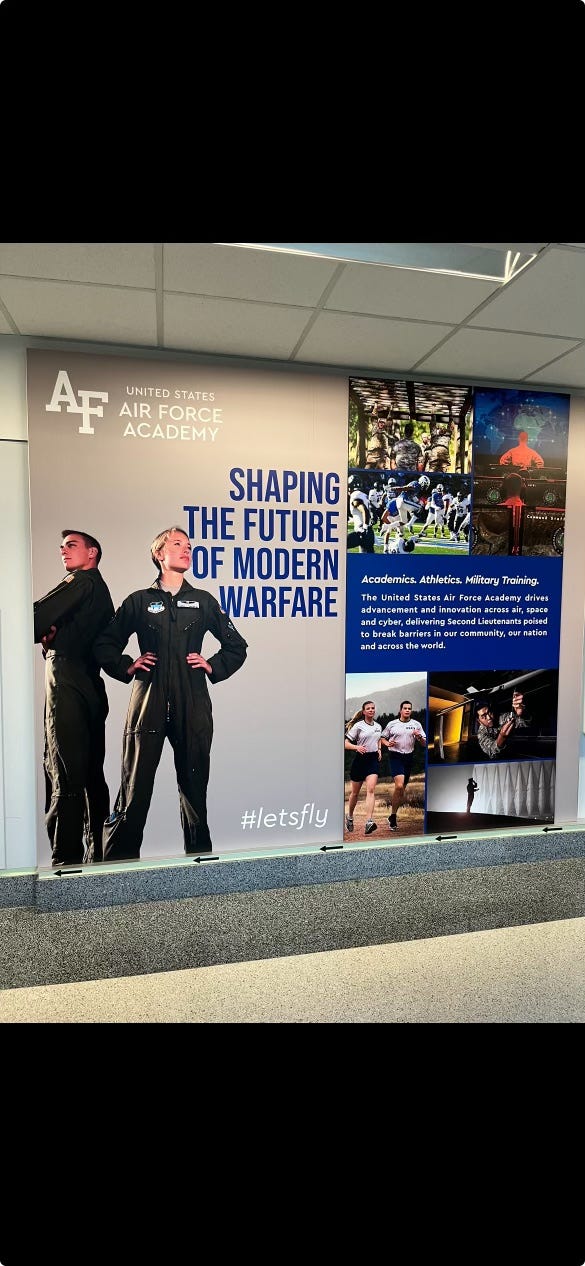
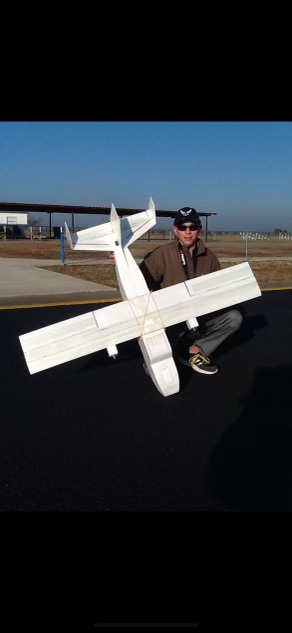
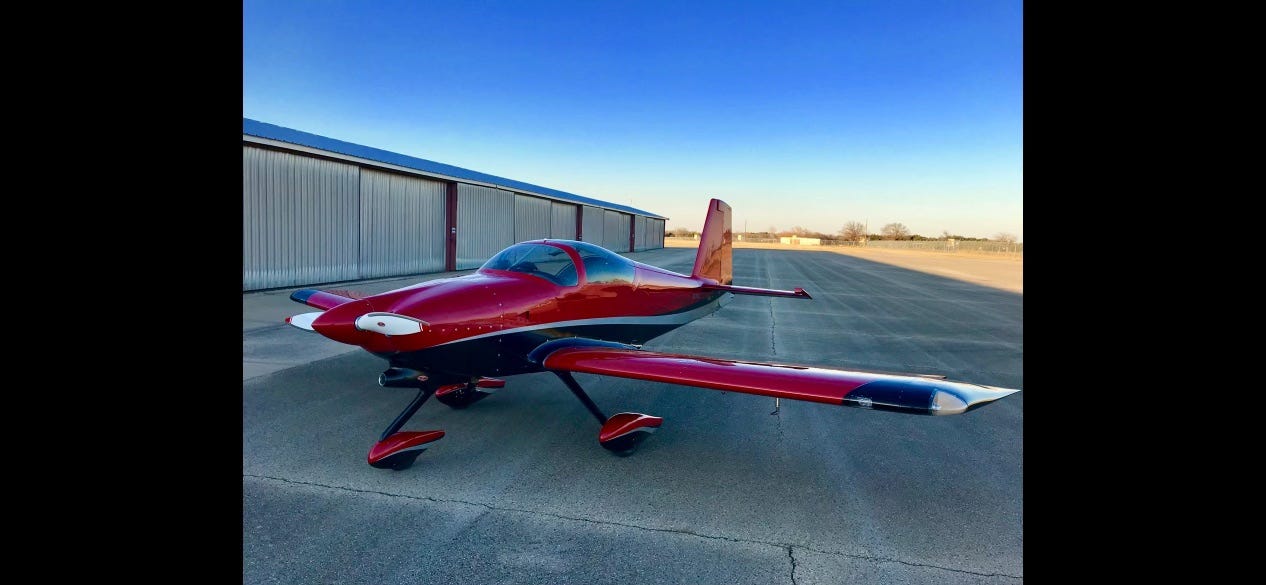
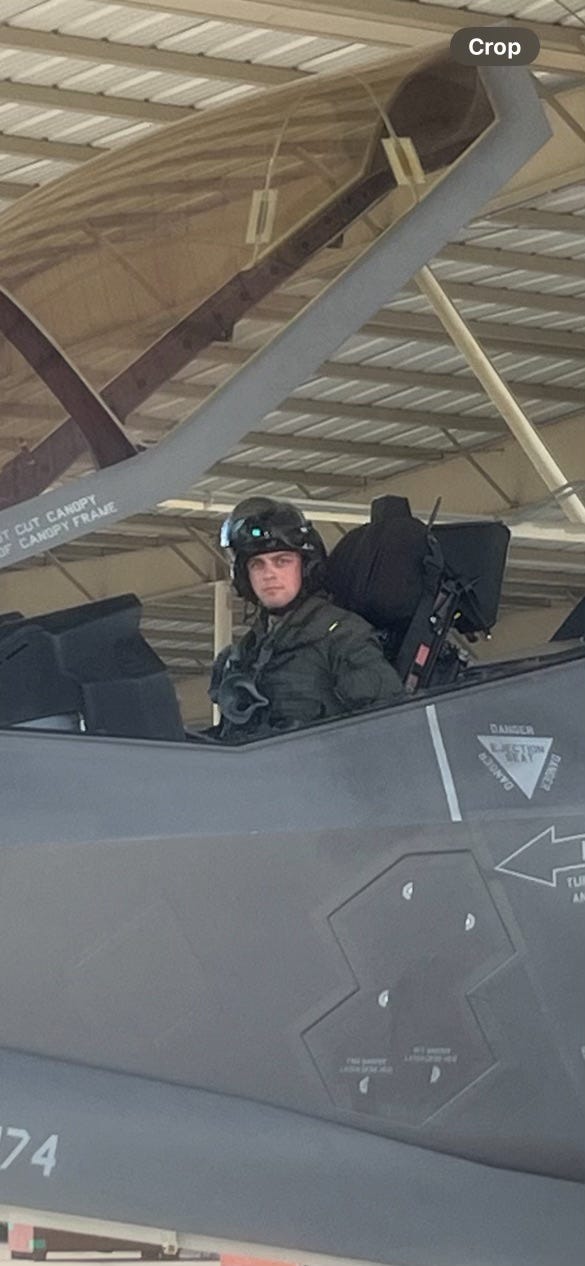





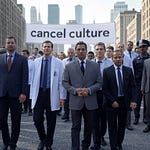
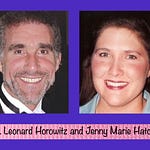



Share this post